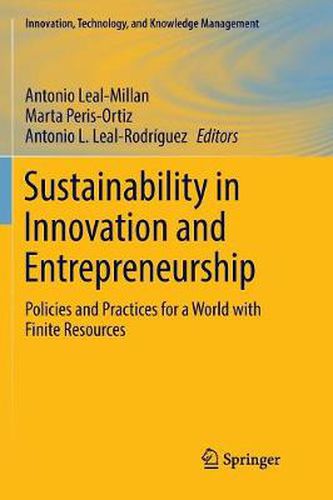Readings Newsletter
Become a Readings Member to make your shopping experience even easier.
Sign in or sign up for free!
You’re not far away from qualifying for FREE standard shipping within Australia
You’ve qualified for FREE standard shipping within Australia
The cart is loading…






This title is printed to order. This book may have been self-published. If so, we cannot guarantee the quality of the content. In the main most books will have gone through the editing process however some may not. We therefore suggest that you be aware of this before ordering this book. If in doubt check either the author or publisher’s details as we are unable to accept any returns unless they are faulty. Please contact us if you have any questions.
This book provides a richly illustrated study of sustainability, innovation and entrepreneurship. Specifically, it examines the ways in which governmental policies and practices modify the social conditions necessary to promote innovation in businesses and by so doing impact economic development. Exploring topics such as green innovation, green customer capital, smart cities, green entrepreneurship and environmental responsibility, this book presents some of the most current research and best practices in the field.
In today’s global economy, strategies, policies and practices that address the negative effects of human activity on the environment need to be incorporated into the business framework in order for companies to achieve a sustainable competitive advantage. Around the world, such changes have already resulted in a broad range of products, production methods and technical features that ensure environmental protection. At the same time, the mass media’s communication of a deteriorating earth have motivated a growing number of citizens in both developed and developing nations to modify their consumption habits towards more ecological products. Consequently, an increasing number of companies are reacting to these changes in business and legal frameworks and consumer preferences by investing in new forms of green innovation or eco-innovation designed to promote both environmental and corporate sustainability. For example, Hewlett-Packard eliminated lead from its welding process; Wal-Mart reduced the emissions of their suppliers; and Cisco, Dell and IBM are investing in smart grids. This volume showcases pioneering efforts among companies, citizens, and government agencies that are moving from theory to practice by placing sustainability at the core of their development strategies.
$9.00 standard shipping within Australia
FREE standard shipping within Australia for orders over $100.00
Express & International shipping calculated at checkout
This title is printed to order. This book may have been self-published. If so, we cannot guarantee the quality of the content. In the main most books will have gone through the editing process however some may not. We therefore suggest that you be aware of this before ordering this book. If in doubt check either the author or publisher’s details as we are unable to accept any returns unless they are faulty. Please contact us if you have any questions.
This book provides a richly illustrated study of sustainability, innovation and entrepreneurship. Specifically, it examines the ways in which governmental policies and practices modify the social conditions necessary to promote innovation in businesses and by so doing impact economic development. Exploring topics such as green innovation, green customer capital, smart cities, green entrepreneurship and environmental responsibility, this book presents some of the most current research and best practices in the field.
In today’s global economy, strategies, policies and practices that address the negative effects of human activity on the environment need to be incorporated into the business framework in order for companies to achieve a sustainable competitive advantage. Around the world, such changes have already resulted in a broad range of products, production methods and technical features that ensure environmental protection. At the same time, the mass media’s communication of a deteriorating earth have motivated a growing number of citizens in both developed and developing nations to modify their consumption habits towards more ecological products. Consequently, an increasing number of companies are reacting to these changes in business and legal frameworks and consumer preferences by investing in new forms of green innovation or eco-innovation designed to promote both environmental and corporate sustainability. For example, Hewlett-Packard eliminated lead from its welding process; Wal-Mart reduced the emissions of their suppliers; and Cisco, Dell and IBM are investing in smart grids. This volume showcases pioneering efforts among companies, citizens, and government agencies that are moving from theory to practice by placing sustainability at the core of their development strategies.